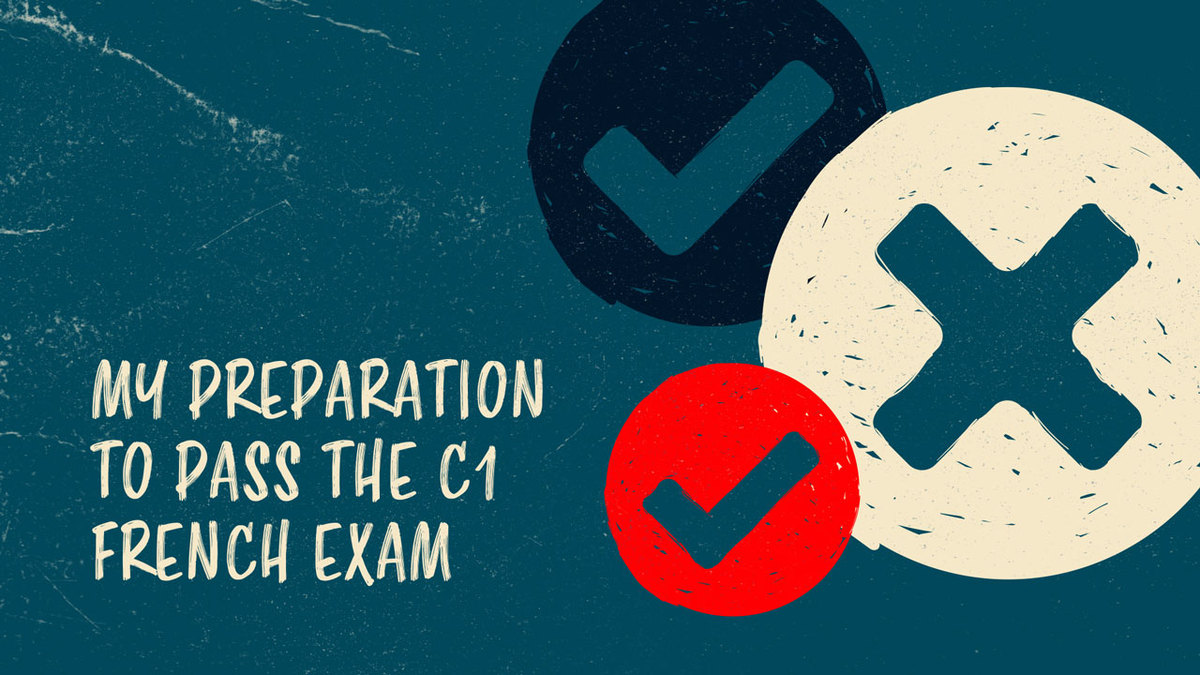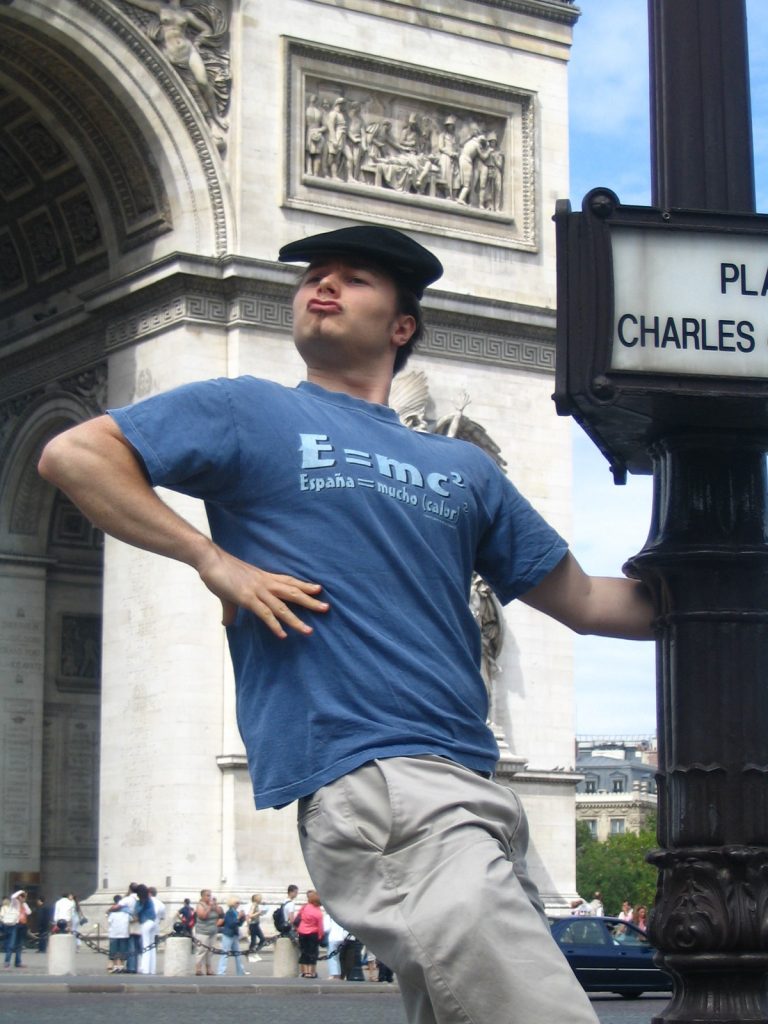How I Prepared for the French Fluency Test (C1 Exam)
How can you master French? One way is to set yourself the goal of passing the French fluency test, a.k.a. reaching C1 or C2 level. I’ll explain more about that in a moment.
My main focus on this blog is how to get started in language learning. Getting started is one of the biggest hurdles for many language learners, which is why I’ve maintained this focus.
However, in this post, I’ll help you explore how to reach advanced levels of speaking a language.
This post is targeted at those of you who have already reached an intermediate level in your language learning. I’ll show you how I passed the C1 French exam.
Table of contents
French Fluency Test? Explaining the C1 Level
On the European Common Framework (CEFR), C1 means you know a language to an advanced level.
(If you’re not familiar with CEFR Levels, here’s the perfect article to catch up.)
Reaching C1 means you can understand long, demanding texts, speak fluently without searching for expressions, and understand implicit meanings. You can also use the language for business and academic purposes.
Beyond that, this is a fun level to reach as a language learner, since at this stage you can understand sly or subtle jokes, and you’ll know most of the colourful expressions in the language.
The only level above C1 is C2 – complete mastery.
French is the first language that I sat a formal exam in, back in 2005, when I tried out the DELF B2 level exam. B2 is an upper intermediate level (what I usually call “fluent”), directly below C1.
At the time I took this exam, I had no idea what each level meant.
I worked very hard on my French for over three months. As it turned out, I was more than capable of communicating at B2 level and passed the exam very safely. After this, I lived in another French speaking region and worked as a professional translator in French for several years. This involved reading many technical documents and necessarily ensuring a mastery level in the language.
Ever since I mastered French, I’ve meant to come back to it and take a formal CEFR exam. Over the past decade, I’ve sat the Spanish C2 exam and German C2 exam, so I’ve got a much greater understanding of what the different CEFR levels mean.
Yet 10 years passed and I kept putting off formal French exams… Until now!
Why I Decided to Focus on C1 French before C2
I had a chaotic travel itinerary (never in the same place for more than a few weeks), which made it difficult to arrange to sit a genuine certification exam.
As such, I decided to do a “mock” exam. It would be marked and corrected by a professional French teacher – and native French speaker. And I would sit it under similar circumstances as the real thing.
This way I could take the exam at a time convenient for me. It wouldn’t involve me travelling to an official examination centre, since the whole exam would be conducted over Skype or offline in a limited time.
Obviously, I wouldn’t be awarded any actual certificate. But this was a personal rather than professional goal, so sitting a mock French fluency exam seemed infinitely more convenient.
If you too would like the challenge of taking an exam but can’t necessarily afford the cost or travel to the exam site… I highly suggest you consider taking a mock exam instead!
Since I assessed my ability as somewhere between C1 and C2, I decided to take it one step at a time and focus on getting a solid C1.
I saw the mock exam as a solid milestone. Once I’d passed it, I planned to take a formal C2 exam after I’d settled down from all my travelling.
How to Do a Mock French Fluency Test
I grew up in Ireland where “mock exams” are part of every high school student’s life. In these mock exams, the results weren’t the main focus. Rather, the exams acted as gauges for how the real exam would look and feel.
I found my mock exams incredibly helpful in figuring out how to best approach exams. I learned to make sure I was giving each section of the exam enough time. It’s a very common problem for test-takers.
The mock exams helped to highlight my weaknesses. They also revealed the grade I could expect from the real exam if I did no further work.
Because of my high school experience with mock exams, I now advise all language learners to attempt their own mock exams. This is especially relevant if you’re planning to get a certificate in language proficiency.
Many exam boards allow you to download previous exam papers from their website. Here is the one that I sat for French.
If you need help finding an exam paper, ask your language tutor. I find most of my teachers on italki.
(If you’re curious, here’s how I select my teachers).
You really need to get one of their “professional teachers” to help you with an exam. They tend to be certified and are likely to be familiar with the very exam you’ll be taking. They may even have experience of marking exam papers.
My teacher, Léa, was part of a small network of French teachers on the website Léacafé. She helped me through the entire process of the mock exam. She also pointed out what I had to work on to reach C2 level.
My Experience of Speaking, Reading and Writing Advanced French
Even with mock exams, it’s important to prepare properly. So even if you see it as a simple preparation for the “real” exam, you still need to prepare for the preparation!
For each part of the mock exam – listening, reading, writing and speaking – I tried to get ready as best as I could in advance.
French C1 Oral Comprehension
To practice for the oral comprehension section, I listened to French newscasters and YouTube videos together with my teacher, Léa. Then Léa would ask me complex questions about what I’d just heard.
This is exactly how the comprehension section works on C-level tests, whereas the A and even B level audio comprehension tests could simply involve picking a word out of what you heard.
Once, for instance, Léa showed me a YouTube video of a bunch of teenage girls arguing and yelling at each other all at the same time. She then asked me to “simply” summarize the video in my own words.
It was a brain-melting task because they were using lots of slang, speaking very fast and talking over one another. But sometimes these brain-melting tasks are just what you need to level up your language skills.
Since I focus so much on speaking in the early stages of my language learning, my listening comprehension tends to be weaker. In the exam, I could easily get the gist of the audio, but the questions asked at C1 level require you to fully understand every aspect of what’s being said.
I didn’t do well in this section, so even though I “passed” the rest of the exam, I wouldn’t have passed the full exam because I would have failed this section. This meant I had to sit a second mock version of this section.
As we were not doing the entire exam at once, but one section at a time until I had it right, I did another oral comprehension test and this time remained focused. I took careful notes on everything that was said, and just about passed.
I also had a problem with audio comprehension in my German C2 exam. This tells me that I need to give a much bigger proportion of my time to listening comprehension and tuning my ear when I want to reach a C1 or C2 level.
Unfortunately I am a little hard of hearing, so that doesn’t help. Nevertheless, I’ll continue to work on my listening comprehension in all my languages.
To get ready for the C2 French exam, I spent a lot of time listening to the higher levels of the Frenchpod101 lessons.
French C1 Reading Comprehension
Once again, at the C-levels this starts to get really tricky as you need to understand the subtle cues that the author is giving you.
The questions are very far from asking you to find a simple fact in the text. Even the multiple choice options leave you wondering how the article explicitly says any of the options.
The best way by far to do well here is through lots of reading.
I had been enjoying Jules Verne novels in their original French. Proud as I was about this fact, you can imagine how I felt when I saw them marked as B1 level books in Gibert Jeune in Paris!
This means that I had to up my game a lot.
I had a subscription to Le Monde that I read as often as I could, but it’s not as engaging as I like.
Léa introduced me to Le Gorafi, which is Verlan for “Figaro” (a major newspaper). It’s essentially the French equivalent of the Onion, and I enjoy reading this for fun.
I recognised that I needed to use a reading tool like Readlang and properly note hard words. I could also use C1/C2 level exercise books that ask questions after the text to test my true comprehension.
In the end, I barely got enough points in this section, and need to improve it dramatically if a C2 level reading comprehension exam was on the horizon.
French C1 Speaking and Writing
In the CEFR exams, speaking and writing are called “oral and written production”.
My language learning approach always favours interaction with people, so this is the section of the exam where I always shine. In the mock exams I got 88% for written production and 90% for oral production.
I love practising my speaking skills, and when I’m practising I make sure that the conversation goes towards complex discussions.
Léa and I have had many interesting debates on a wide variety of topics. I’ve also given her the inside view on the technical workings of my business and website.
What’s more, when I was in France my computer broke down. I had to work with a tech support guy to figure out which part of my computer wasn’t working and check each input, and explain what I was seeing over the phone.
I don’t shy away from chances to use the language in varied ways, and I’ll make sure to keep that up!
For the written production section, I received one important piece of critical feedback: my sentences tended to be a little short.
While I did well in most other aspects, to help me get used to potentially longer sentences we spent a few days looking at Fondements de la métaphysique des mœurs by Immanuel Kant.
The things he describes involve very complex sentences with nested commas that span huge paragraphs. This was perfect.
As we worked on my French writing skills, Léa got me to answer questions on Kant in written form. I would use sentences that would go on but not become nonsensical. It was one hell of a task, considering I wouldn’t even attempt to say or write such things in English!
Wrapping it All Up
I hope you’ve found this account of my journey to reaching French C1 level interesting. I always figured that my French was around C1 or C2 level, and confirmed it with the mock fluency test.
Now that I know my strengths and weaknesses, I can work on them!




Social